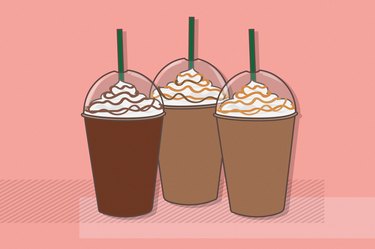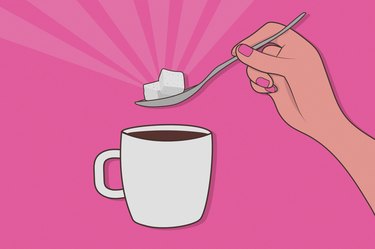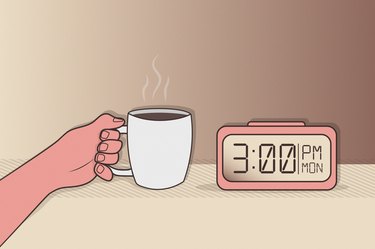
Vanilla, hazelnut, caramel. There's no shortage of artificially flavored coffees available out there. And it makes sense: 63 percent of Americans drink coffee every day, per the National Coffee Association. Naturally, there needs to be a flavor for every kind of coffee drinker.
But if you're a fiend for French vanilla, you may be wondering: Just how healthy are those faux flavors in my morning cup?
Video of the Day
Video of the Day
Below, we break down the basics of the common additives and ask health experts for their take on the question: Is drinking artificially flavored coffee every day "bad" for you?
What Are Artificial Flavors?
There's a good chance you've scanned a food label and seen the words "artificial flavors" listed among the ingredients. The vague term is essentially a catchall that refers to any flavoring agents that aren't derived from natural sources like spices, fruits, vegetables, herbs or animal products, according to the U.S. Food and Drug Administration (FDA).
The catch? Artificial and natural flavors (which can actually be chemically identical) serve the same purpose: to provide flavor — not nutrients — to food substances, says Mary Matone, RD, a registered dietitian at the virtual private practice Culina Health.
What's more, artificial flavors may undergo even more rigorous laboratory testing compared to natural flavors, per Harvard University. So there's that.
Where Does Flavored Coffee Get Its Flavor?
To add a hint of caramel (or another go-to flavor) to your cup, manufacturers may coat coffee beans with artificial flavors that have been combined with a solvent called propylene glycol, a common food additive and flavoring agent, according to the Agency for Toxic Substances and Disease Registry.
Propylene glycol is "generally recognized as safe" (GRAS) for use in food by the FDA.
Are There Health Risks Associated With Artificially Flavored Coffee?
Not really, no. The effects of drinking artificially flavored coffee every day haven't been widely studied among casual coffee drinkers.
In general, artificial flavors are thought to be "safe for consumption at intended levels," per Michigan State University Center Research on Ingredient Safety. But what about exposure at much greater levels?
Research suggests that a very high exposure to various food flavorings (think: among manufacturing plant workers) may raise one's risk of lung disease, per the Centers for Disease Control and Prevention (CDC).
Of course, it's important to note that mixing food chemicals day in and day out is nowhere near the same as sipping a cuppa' French vanilla on your way to work.
People Who Should Limit Artificially Flavored Coffee
Anyone With a Rare Food Allergy
Flavor agents that contain any of the nine most common food allergens must disclose their presence, but less common allergens are not required to be listed, according to the Environmental Working Group (EWG).
"Anyone with allergies, especially rare food allergies, should be extra careful when consuming foods [or drinks] with added flavors, as we often don't know what chemicals are contained in these flavorings and some could cause an allergic reaction," Matone says.
Anyone Following an Anti-Inflammatory Diet
"While it isn't necessary for everyone to completely eliminate products that contain artificial flavors, we should consider the amounts of these foods and drinks that we consume, especially if we're aiming to follow an anti-inflammatory diet," Matone says.
That is, artificial flavors are typically found in processed foods and drinks that also contain other pro-inflammatory ingredients, like certain plant oils and refined sugars.
When it comes to artificially flavored coffees, the beans themselves aren't usually sweetened. The creamer and three pumps of caramel syrup you added to your flavored coffee though? Well, that's another story…
Tip
Artificial flavors tend to be applied to extremely low-quality coffee beans. If you pride yourself on drinking the good stuff, consider opting for a less processed, higher-quality roast, then add one of the flavor agents below.
How to Add Flavor to Coffee
Spices
The most nutritious way to flavor your coffee is to DIY. Buy unflavored beans (bonus points if they're organic) and then add your own mix-ins, like antioxidant-rich spices.
"Cinnamon, clove, nutmeg or cocoa powder are a few fun ideas to get started with," Matone says. "In addition to tasting good, many of these spices have anti-inflammatory properties, which can give your morning coffee an extra nutritional boost."
Milk and Creamer
Cow's milk or unsweetened plant-based milks are low-sugar ways to lighten up your cup. If you're committed to creamer, be a label detective and check out what's in your go-to product.
"Coffee creamers often contain thickening and stabilizing agents like carrageenan as well as partially hydrogenated oils," Matone says. "These ingredients are important to consider, as some have been linked with negative health outcomes such as cardiovascular disease."
Many creamers are also sweetened and their added sugars can add up quickly, particularly for people who are trying to manage their blood sugar levels.
Tip
Of course, serving size is important too. “The amount of creamer you’re using matters when assessing the risk of these ingredients,” Matone adds. “For someone who uses just a splash of creamer on an occasional basis, these ingredients are not likely to cause harm.”
The Bottom Line
"There are no major health risks associated with consuming artificially flavored drinks regularly," says Megan Meyer, PhD, senior director of science communications at the International Food Information Council (IFIC).
Still, if you're trying to minimize the amount of processed foods and drinks in your diet, consider opting for unflavored coffee beans and adding your own nourishing ingredients, like blood sugar-stabilizing cinnamon, for some natural flavor.
"When it comes to good nutrition, what matters most is our eating [and drinking] patterns over the long haul," Meyer notes. "And of course it's important to keep caffeine consumption in check." Aim to stay below 400 milligrams of caffeine per day, which comes out to about four 8-ounce cups of coffee.
- National Coffee Association: “Celebrate National Coffee Day with latest data on America’s favorite beverage”
- U.S. Food and Drug Administration: “Code of Federal Regulations Title 21”
- Harvard University: “The Flavor Rundown: Natural vs. Artificial Flavors”
- Agency for Toxic Substances and Disease Registry: “ToxFAQs for Propylene Glycol”
- Michigan State University Center Research on Ingredient Safety: “Flavors - Natural & Artificial”
- Centers for Disease Control and Prevention: “Flavoring Symptoms and Medical Monitoring”



